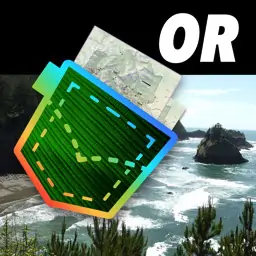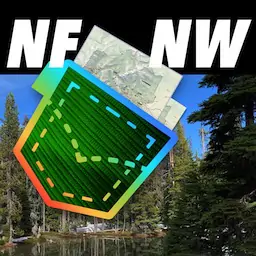Map & GuideOregon Dunes |
Map and Guide of Oregon Dunes National Recreation Area (NRA) within the Siuslaw National Forest (NF) in Oregon. Published by the U.S. Forest Service (USFS).
featured in
| Oregon Pocket Maps |  | |
| National Forests Northwest |  |
United States Department of Agriculture
OREGON DUNES
NATIONAL RECREATION AREA
MAP & GUIDE
Welcome to the Oregon Dunes
National Recreation Area!
In 1972 Congress recognized the unique value of the Oregon Dunes by designating the National Recreation Area to
be managed by the U.S. Forest Service for “public outdoor
recreation use and enjoyment by present and future generations, and the conservation of scenic, scientific, historic
values…”
Formed by the ancient forces of wind, water and time, these
dunes are like no others in North America, and extend for
40 miles along the Oregon coast between Florence and Coos
Bay. Wind sculpted dunes tower almost 500 feet above the
ocean shore and blend with rivers, lakes and temperate rainforests to create a remarkably diverse ecosystem.
Explore the largest
expanse of coastal sand
dunes in North America.
Enjoy hiking through forests and dunes, riding an off-highway vehicle through a landscape of sand, or watching a
sunset from a scenic beach. How about picnicking, camping,
boating or fishing on one of the 30 lakes or rivers? Perhaps
you’re a birder, beachcomber, berry or mushroom gatherer,
or looking for accessibility? There are many opportunities to
enjoy this special area.
Please remember to share the responsibility of stewardship
for this rare, ecologically complex, and beautiful national
treasure. Tread Lightly!
Oregon Dunes Visitor Center
Visitor information and bookstore
855 Hwy 101
Reedsport, OR 97467
Phone: 541-271-6000
Visit our website: http://www.fs.usda.gov/siuslaw
@siuslawnf
@SiuslawNF
Camping
Most developed campgrounds on the forest can be reserved
in advance. Reserve online at www.recreation.gov or call toll
free 1-877-444-6777 (International: 518-885-3639, TDD:
877-333-6777).
Sand camps are sites are located directly on the sand,
dispersed along the Oregon Dunes National Recreation
Area. Camping access is by Off Highway Vehicle (OHV) on
soft sand only and is allowed by reservation only through
www.recreation.gov.
Passes
At some popular sites, a day-use fee may be required
but many sites do not require fees. Recreation fees help
maintain facilities and provide services. Day-use fees are $5
per vehicle per day. You can purchase your pass online at
discovernw.org or on site (cash or check only).
Other passes are also accepted. Popular passes include the
$30 Northwest Forest Pass (good for 1 year for national
forest sites in OR and WA), or the $80 America the Beautiful
Annual Pass (good for 1 year for more than 2,000 Federal
recreation sites.), and the $35 Oregon Pacific Coast Passport
(good for 1 year at coastal Oregon State Parks and Federal
sites).
Other passes available include the Senior Pass (62+ older),
Access Pass (permanent disability), Military Pass (current
U.S. military members and dependents), and the 4th Grade
Pass (free for 4th grade students). Learn more at https://
store.usgs.gov/pass.
Siuslaw
National
Forest
How did all this sand get here?
Like you, these sands traveled long and far.
How far and how long did you travel to get here? For the
grains of the Oregon Dunes, it has taken about 55 million
years, starting with the building of the Coast and Cascade
Mountain Ranges.
Following the mountains’ formation, glaciers, rivers, wind,
and rainfall began to grind these peaks down to tiny grains
of sand and carry them to the ocean. There, currents push
the sand onshore, where winds sculpt each grain into dunes.
Wind Carves the Dunes
The Foredune is a low hill parallel to the ocean. It exists
because European beachgrass slows the wind, causing sand
to drop out and pile up.
Behind the foredune, the wind scours out the Deflation
Plain all the way down to the water table and provides an
area for plants to thrive.
Summer winds carve wave patterns in the sand called
Transverse Dunes. As the seasonal winds change direction,
so do the patterns in the sand.
At times the forest marches forward, other times the dunes
smother the forest. Sometimes dunes leave pockets of forest,
called Tree Islands, surrounded by sand.
Oblique Dunes are the largest and most spectacular dunes,
sometimes growing as tall as 180 feet and pushing inland 3
to 16 feet per year.
Dune Invaders!
European beachgrass was planted along the West Coast
in the early 1900s to stabilize sandy coastlines and protect
roads, water supplies, jetties, and homes. The grass thrived in
its new environment.
Beachgrass gains the upper hand
The grass slowed the sand’s movement, and it piled up in a
huge long foredune along the beach. Behind this dune, plants
found a better place to grow. In just 50 years, huge mats of
vegetation formed where there was once open sand. Now,
plants and animals that need open sandy areas struggle to
survive, and the open sand disappears from view.
Land managers battle back
European beachgrass is tough. It spreads quickly and thrives
when buried under sand. Managers are exploring ways to
control the grass, including hand-pulling, bulldozing, and
spraying herbicides.
Who will win the battle? Only time will tell.
Sharing the Beach with the
Western Snowy Plover
Where the Coast Mountain Range
meets the Dunes and Ocean
Where is your home? For a local bird, the coastal sand
is home, nursery and grocery store. The Western Snowy
Plover needs dry, open sand along the beach to survive. As
the European beachgrass invades the open sand, it reduces
nesting areas and provides homes for predators. This bird is
now threatened with extinction.
The mild wet climate creates a lush rainforest, lakes and
rivers…and home for many birds.
If you think no one is home, look again!
Siltcoos
Imagine blending into your home so well no could see you!
The plover’s feathers and nests blend into the sand. This
disguise protects the birds from predators; but people, who
cannot see the birds, sometimes walk through the birds’
sandy nests thinking no one is home.
You can help the Snowy Plover!
From March 15-September 15 please
observe all posted regulations
No dogs, vehicles, bicycles, kites, or
drones are allowed on plover beaches.
Walk on wet, hard-packed sand only.
Learn more at http://go.usa.gov/x9AfP.
Often seen at…
South Jetty
Osprey, Marsh Wren, Coopers Hawk, Tundra Swan
Great Blue Heron
Oregon Day Use
Stellars Jay, Wren-tit, Bald Eagle
Eel Creek Campground
Northern Flicker, Chestnut Backed Chickadee
Bluebill Trail
Mallards, Northern Harrier, White-tailed Kite
Legend
In an EMERGENCY, dial 911
During Earthquakes...
If outdoors, STAY OUTDOORS. Avoid
buildings, lights and power lines.
After an Earthquake a TSUNAMI is possible
Before and during a Tsunami...
Immediately MOVE INLAND to HIGHER GROUND
and stay there. STAY AWAY FROM THE BEACH!
Never go down to the beach to watch a tsunami come
in. If you can see the wave you are too close. If the water
moves AWAY from the shoreline, move inland to higher
ground immediately!
Further information regarding tsunami safety, evacuation,
safe relocation and the tsunami ready program is
available at www.tsunami.gov. For emergency planning
information and how to put together an emergency
kit and other preparedness initiatives to be ready for
disasters, visit www.ready.gov.
Tour Guides
Under Forest Service Permit
Guided Vehicle Tours
• Sandland Adventures
• Sand Dunes Frontier
• Spinreel Rentals


